While legal clarity and clinical precision form the structure of a surrogacy journey, it’s compassion and connection that breathe life into it. For many intended parents, this isn’t just a path to parenthood—it’s the most intimate hope they’ve ever shared. And they don’t want to feel like clients in a system; they want to feel like people in a relationship.
Even in arrangements that are meant to be strictly professional, a warm connection with the surrogate, the agency, and the team brings a sense of comfort. It softens the stress and reminds intended parents that they’re not alone. A kind check-in, a moment of shared excitement after an ultrasound, or a thoughtful message of reassurance during the waiting—all of it matters.
Agencies that foster this sense of relationship—not forced intimacy, but genuine human care—build trust that lasts far beyond delivery. And for many intended parents, that emotional grounding is just as valuable as the medical outcomes.
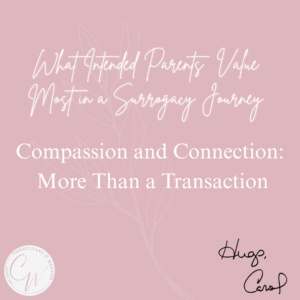
Legal and Logistical Certainty: Turning Complexity Into Confidence
For intended parents—especially those navigating surrogacy across state or national borders—clarity around legal and logistical matters is not just comforting, it’s essential.
They need to know, with confidence, that the agency and their attorney have a firm grasp of the laws surrounding parentage in the surrogate’s state or country, and how those laws affect custody, birth certificates, insurance, and post-birth travel. International intended parents, in particular, often feel overwhelmed by unfamiliar systems—concerned not just with the pregnancy, but with citizenship, visas, and hospital protocols.
This is where a knowledgeable, well-organized agency becomes invaluable. Clear timelines, document checklists, and legal explanations (delivered without jargon) provide a sense of structure. Equally important is the coordination between attorneys, medical teams, and government agencies—ensuring that no step is missed and that intended parents feel supported, not sidelined.
When agencies lead with precision and proactive planning, intended parents are better able to enjoy the experience—because they’re not bracing for last-minute surprises. They feel like partners in the process, not passengers.
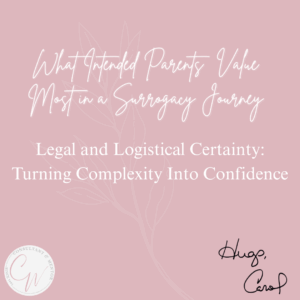
Medical and Psychological Readiness of the Surrogate: Trusting the Foundation
For intended parents, the decision to move forward with a surrogate is both hopeful and vulnerable. They’re placing their trust—and often their only remaining embryos—in someone else’s care. That level of trust doesn’t come from a résumé; it comes from thorough, professional evaluation and thoughtful preparation.
Medical readiness is just the beginning. Intended parents want to know that the surrogate has had a detailed health review, understands the treatment protocol, and has the physical ability to carry a pregnancy safely. But equally important is her psychological preparedness—does she truly understand the demands of the journey, emotionally and relationally? Has she considered the commitments, boundaries, and potential “what ifs”?
Experienced agencies don’t rush this part. They ensure the surrogate’s motivations are clear, her support system is in place, and that she’s entering the process for the right reasons. When intended parents feel that these screenings have been done with care and depth—not just as formalities—they’re more at ease, knowing the foundation is solid.
That peace of mind allows the relationship to grow with confidence instead of caution.
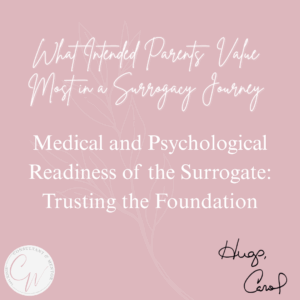
Communication Clarity: Setting the Tone from the Start
For many intended parents, communication is not just a preference—it’s a cornerstone of their journey. How updates are shared, how often contact occurs, who initiates discussions, and how everyone stays informed can shape the entire emotional arc of the journey.
What they need is predictability. Not rigid rules, but a mutual understanding established early on: Do we text? Video chat? Do intended parents attend appointments or wait for updates afterward? Do we want regular check-ins or milestone-only communication?
When these questions are left unasked, assumptions creep in—and mismatched expectations often follow. A surrogate might feel overwhelmed by too many messages. Intended parents might feel disconnected by too few. But when the communication plan is clarified in the earliest stages—ideally during or even before matching—everyone feels more grounded and respected.
And when handled with compassion, these conversations create more than schedules. They create comfort, connection, and a shared rhythm that sustains the relationship through each phase of the process.
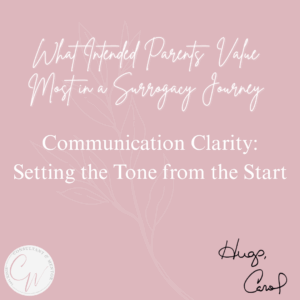
Professional Support Systems: More Than Just a Safety Net
For intended parents, stepping into a surrogacy journey often means entering unfamiliar territory—legal intricacies, medical timelines, emotional highs and lows. What brings reassurance is knowing they’re not navigating it alone.
Access to a comprehensive, professional support system—including licensed psychologists, experienced attorneys, compassionate case managers, and trusted clinics—provides more than logistics. It offers peace of mind.
Psychological support helps intended parents manage complex emotions: anxiety about outcomes, fears of disappointment, or even navigating their own fertility history. Legal experts ensure rights and responsibilities are clear, boundaries are protected, and that both parties feel respected throughout the contract process. Medical teams bring predictability and transparency to procedures. And a responsive agency coordinator acts as the steady, informed hand guiding them through each step.
When these professionals work together—anchored by ethical standards and open communication—intended parents can focus more on hope and connection, and less on managing risk. They feel held, not just handled.
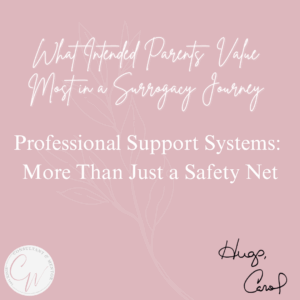
Alignment of Values and Intentions: More Than Just a Match
A successful surrogacy journey doesn’t begin with a contract—it begins with shared understanding. Intended parents often feel the most peace of mind when they know they’re aligned with their surrogate not just legally, but emotionally and ethically.
These values can show up in quiet yet profound ways: views on selective reduction, preferences for lifestyle choices during pregnancy, openness to communication, and expectations around how the relationship continues after birth. None of these are “right” or “wrong,” but misalignment can lead to confusion or conflict when clarity is needed most.
That’s why it’s crucial for agencies to foster conversations early on that go deeper than surface-level questions. It’s not enough to ask, “Are you comfortable with X?”—we need to ask, “How do you feel about this, and why?” That’s where intention surfaces, and where alignment can truly be assessed.
When intended parents feel seen and understood in their values—and when they sense that their surrogate holds similar intentions—they’re far more likely to feel secure, supported, and emotionally connected throughout the process.
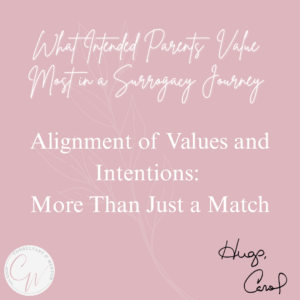
Trust and Transparency: The Foundation of a Meaningful Journey
For intended parents, embarking on a surrogacy journey is both deeply personal and legally complex. Amid the contracts, clinics, and consultations, what they crave most is trust—trust in the agency, trust in the process, and trust in the person carrying their child.
That trust begins with transparency. When an agency is clear from the start—about financial structures, timelines, risks, emotional support systems, and legal procedures—it gives intended parents something to lean on. They don’t need guarantees (because in this field, there are few), but they do need to feel that no one is keeping quiet about hard truths.
Transparency also extends to the surrogate match itself. Intended parents appreciate candid discussions around preferences, values, and even potential challenges. When all parties feel safe asking questions and sharing concerns before the match is finalized, the groundwork for a resilient relationship is already being laid.
In short, transparency isn’t a courtesy—it’s a necessity. And agencies that prioritize it are the ones intended parents remember and recommend.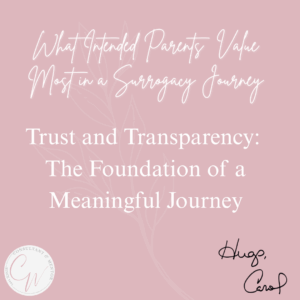
Blog Series: What Intended Parents Value Most in a Surrogacy Journey
While every surrogacy journey is unique, intended parents often share common hopes, questions, and concerns as they navigate the process. Over the years, I’ve observed seven themes that consistently emerge—each one offering a window into what matters most from their perspective.
This series explores those themes in depth, from the importance of transparency and shared values to the practical need for legal clarity and emotional connection. Whether you’re an agency professional, a surrogate, or an intended parent yourself, these reflections are designed to guide thoughtful, ethical, and compassionate surrogacy experiences.

What Surrogates Need Most: The Emotional Journey-Before, During, and After the Pregnancy
Finally, surrogates often talk about the emotional complexity of the experience—how deeply rewarding and uniquely challenging it can be.
They may experience unexpected feelings of grief, guilt, or even loss after delivery—not because they want to keep the baby, but because something profoundly intimate has ended. What they need is reassurance that the agency and the family will still be there—if only to say “thank you” or check in.
Emotional aftercare matters. It closes the loop. It validates the magnitude of the gift given. And it helps surrogates transition into life post-surrogacy with pride, peace, and support.
What Surrogates Need Most: Legal Protection and Advocacy
Legal agreements can feel overwhelming, especially for first-time surrogates. What surrogates want is someone who will stand beside them—who will make sure their rights are protected and their voice is heard.
Agencies play a vital role here. Ensuring that surrogates have independent legal counsel, that contracts are explained in plain language, and that surrogates never feel rushed to sign—these steps build long-term trust and reduce the risk of conflict later.
Legal protection isn’t just about terms; it’s about being respected as an equal party in the process.
